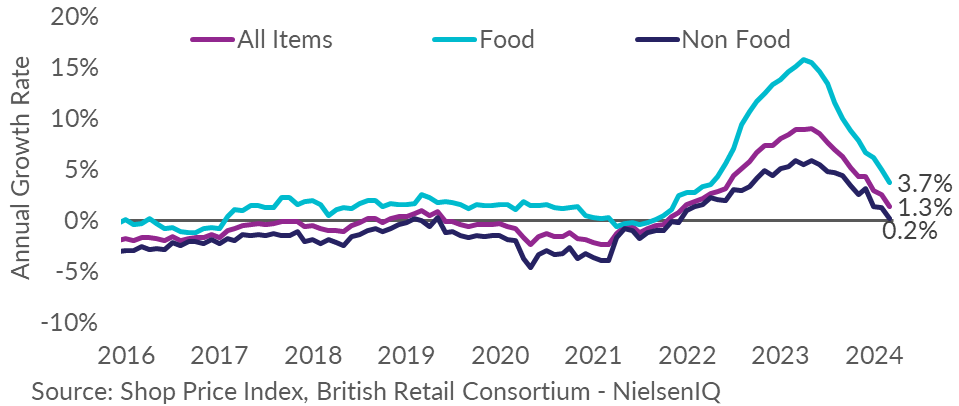BRC-NIELSENIQ SHOP PRICE INDEX – March 2024
Period Covered:
01 – 07 March
2024
- Shop Price annual inflation eased to 1.3% in March, down from
2.5% in February. This is below the 3-month average rate of 2.2%.
Shop price annual growth is its lowest since December 2021.
- Non-Food inflation fell to 0.2% in March, down from 1.3% in
the preceding month. This is below the 3-month average rate of
0.9%. Inflation is its lowest since January 2022.
- Food inflation decelerated to 3.7% in March, down from
5.0% in February. This is below the 3-month average rate of 4.8%
and is the tenth consecutive deceleration in the food category.
Inflation is its lowest since April 2022.
- Fresh Food inflation slowed further in March, to 2.6%, down
from 3.4% in February. This is below the 3-month average rate of
3.6%. Inflation is its lowest since November 2021.
- Ambient Food inflation decelerated to 5.2% in March, down
from 7.2% in February. This is below the 3-month average rate of
6.6% and is the lowest since June 2022.
|
|
OVERALL SPI
|
FOOD
|
NON-FOOD
|
|
% Change
|
On last year
|
On last month
|
On last year
|
On last month
|
On last year
|
On last month
|
|
Mar-24
|
1.3
|
-0.4
|
3.7
|
-0.3
|
0.2
|
-0.4
|
|
Feb-24
|
2.5
|
0.4
|
5.0
|
-0.1
|
1.3
|
0.7
|
Note: Month-on-month % change refers to changes in the
level of prices.

Helen Dickinson, Chief Executive of the British Retail
Consortium, said:
“Shop price inflation eased to the
lowest level since December 2021 last month as retailers
continued to compete fiercely to bring prices down for their
customers. While Easter treats were more expensive than in
previous years due to high global cocoa and sugar prices,
retailers provided cracking deals on popular chocolates, which
led to price falls compared to the previous month. Dairy prices
also fell on the month as farmgate prices eased, and retailers
worked hard to lower prices for many essentials. In non-food,
prices of electricals, clothing and footwear fell as retailers
increased promotions to entice consumer spending.
“While these figures are good news for consumers, from this
month, retailers face significant increased cost pressures that
could put progress on bringing down inflation at risk. These
costs include a 6.7% business rates rise, ill-thought-out
recycling proposals, and new border checks – all at the same time
as the largest rise to the National Living Wage on record. The
industry needs pro-growth government policy that supports
investment and helps keep down prices for households up and down
the country.”
Mike Watkins, Head of Retailer and Business Insight,
NielsenIQ, said:
“The slowdown in inflation continues
and a key driver this month was a further fall in food prices. A
year ago, food inflation was 15% so this was to be expected. But
it is also helped by intense competition amongst the supermarkets
as they look to drive footfall, with focussed price cuts and
promotional offers earlier in the month for Mother's Day and now
again in the weeks leading up to Easter.”
